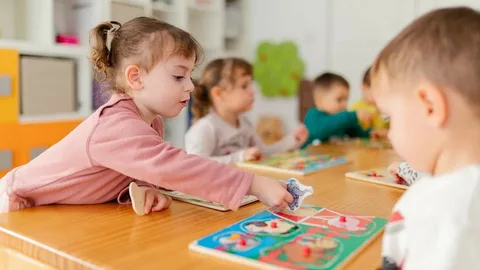The early years of a child’s life are foundational for their future wellbeing, learning, and relationships. During this critical period, social and emotional development plays a vital role, shaping how children understand themselves, relate to others, and cope with challenges. For families in Sydney’s Dulwich Hill, choosing the right early learning centre is key to nurturing these essential skills.
An early learning centre Dulwich Hill offers much more than just childcare—it provides a carefully structured environment where young children develop the social and emotional competencies they need to thrive both now and later in life. In this article, we explore how Dulwich Hill preschool programs foster social and emotional growth through intentional strategies, supportive educators, and engaging experiences.
Understanding Social and Emotional Development in Early Childhood
Before diving into the specific approaches used by early learning centres, it’s important to understand what social and emotional development entails.
-
Social development involves learning to interact effectively with others. This includes skills such as sharing, cooperating, taking turns, and resolving conflicts.
-
Emotional development refers to recognizing, expressing, and managing one’s feelings, as well as developing empathy for others.
Together, these abilities help children form secure relationships, develop self-confidence, and build resilience—qualities that influence success in school, friendships, and life beyond.
The Role of Early Learning Centres in Dulwich Hill
An early learning centre Dulwich Hill is uniquely positioned to nurture social and emotional skills because it offers children consistent opportunities to engage with peers and adults outside the family. Unlike at home, children in these centres experience a diverse social environment that challenges them to navigate complex interactions, practice communication, and understand different perspectives.
Here are several ways Dulwich Hill preschools actively support this development:
1. Creating a Safe and Nurturing Environment
The foundation of effective social and emotional learning is a safe, predictable, and nurturing setting. Dulwich Hill preschools emphasize building trusting relationships between educators and children. When children feel emotionally secure, they are more willing to explore, take risks, and engage socially.
Educators are trained to be sensitive to children’s needs, respond warmly, and provide consistent routines that create a comforting sense of stability. This emotional safety allows children to practice new social skills without fear and develop self-regulation over time.
2. Encouraging Positive Peer Interactions
Early learning centres in Dulwich Hill design daily activities that encourage positive interaction and cooperation among children. Through group play, collaborative projects, and role-playing scenarios, children learn to share, negotiate, and solve problems together.
Educators facilitate these interactions by guiding children through challenges, helping them understand others’ feelings, and modeling respectful communication. This hands-on approach helps children build essential social skills in a natural context.
3. Teaching Emotional Literacy and Self-Regulation
A key focus in Dulwich Hill preschools is helping children identify and express their emotions appropriately. Activities may include storytelling, discussion of feelings, and creative arts that allow children to explore emotions in a safe space.
Moreover, educators teach self-regulation strategies such as deep breathing, counting, or using words to express frustration instead of acting out. These skills empower children to manage their feelings and behaviors effectively, leading to better social outcomes.
4. Individualized Support and Inclusion
Each child’s social and emotional journey is unique. An early learning centre Dulwich Hill recognizes this by providing individualized support for children who may struggle with social skills or emotional challenges.
Educators work closely with families and specialists to develop tailored strategies that support each child’s needs. Additionally, Dulwich Hill preschools prioritize inclusivity, celebrating diverse cultures, abilities, and backgrounds, which enriches children’s understanding and acceptance of others.
5. Fostering Empathy and Respect
Building empathy—the ability to understand and share the feelings of others—is a central goal of early social education. Dulwich Hill preschools integrate empathy-building activities into daily routines.
Children learn to recognize emotions in peers and respond with kindness. Respect for diversity and cooperation are consistently encouraged through group activities, multicultural celebrations, and discussions about fairness and community.
6. Collaborating with Families
Social and emotional development is a partnership between early learning centres and families. Dulwich Hill preschools maintain open communication with parents, sharing observations and strategies to support children’s growth at home and in the centre.
Workshops, newsletters, and meetings empower families to reinforce social-emotional skills and provide consistency between home and preschool environments.
7. Using Play as a Medium for Learning
Play is the natural language of children, and Dulwich Hill preschools use play-based learning as a powerful tool to develop social and emotional competencies.
Through imaginative play, children experiment with social roles, practice negotiation, and express feelings creatively. Educators observe and scaffold these interactions, turning play into meaningful learning experiences.
Real Impact: Stories from Dulwich Hill Preschools
Many families who choose an early learning centre Dulwich Hill report noticeable improvements in their child’s confidence, friendships, and emotional resilience. Parents appreciate how educators provide personalized attention and create a community where every child feels valued.
For example, a parent might share how their shy child blossomed through supportive social activities and learned to communicate needs effectively. Or how children who initially struggled with frustration developed self-regulation techniques that helped them succeed in group settings.
These stories highlight the transformative power of quality early education focused on social and emotional development.
Why Choose a Dulwich Hill Preschool?
Selecting the right preschool is about more than convenience—it’s about finding a place that truly understands childhood development and supports your child’s whole wellbeing.
Early learning centres in Dulwich Hill are known for:
-
Highly trained educators dedicated to social-emotional growth
-
Safe, inclusive, and stimulating learning environments
-
Play-based curricula designed to nurture emotional intelligence and social skills
-
Strong family partnerships to ensure consistent support
-
Commitment to diversity and individualized learning
For families seeking a nurturing start for their child, Dulwich Hill preschools provide an ideal foundation for lifelong success.
Conclusion
The social and emotional skills children develop during their early years set the stage for all future learning and relationships. By choosing an early learning centre Dulwich Hill, families give their children access to expert guidance, supportive environments, and rich social experiences that foster these essential competencies.
From fostering empathy and respect to teaching self-regulation and cooperation, Dulwich Hill preschools play a vital role in helping children grow into confident, resilient, and compassionate individuals.
If you’re considering enrolment, take the time to visit local centres, meet the educators, and observe how they support social and emotional development. The right preschool can make all the difference in your child’s early years—and beyond.

